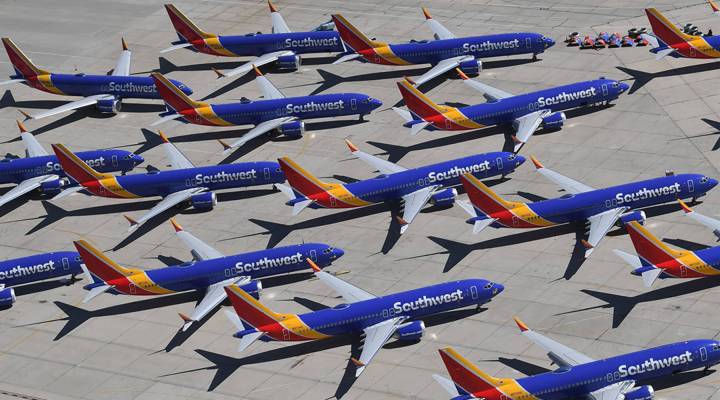
Boeing’s 737 Max troubles drag on

Pressure on Boeing is intensifying in the wake of a preliminary report from the Ethiopian government into the crash of a Boeing 737 Max-8 jet last month. The report said Ethiopian Airlines crew followed Boeing procedure but could not prevent the crash, which killed all 157 people on board.
Boeing is working to fix the plane’s safety issues. But it’s uncertain how soon the company will submit changes in flight-control software, cockpit indicators and pilot-training to U.S. aviation regulators, and how soon after that the planes might be certified to fly again.
In the meantime, all 737 Max jets around the world are grounded. Airlines aren’t accepting new planes or cutting checks to Boeing for final delivery. There are nearly 5,000 737 Max jets on order, and production has continued at the same breakneck pace (52/month, according to Boeing) as before the worldwide grounding. Finished planes are stacking up at Boeing facilities across the Puget Sound region.

At Boeing’s Renton, Washington, assembly complex, new 737 Max jets keep rolling off the assembly line around the clock, at 52/month, the same pace as before the worldwide grounding. Airlines aren’t taking delivery, so new planes are being stored at Boeing facilities across the Puget Sound region.
“The 737 is the most important program to Boeing,” said Scott Hamilton, an aerospace industry analyst with Leeham Company on Bainbridge Island, near Seattle.
Hamilton said he’s disheartened about news reports that Boeing charged extra for some safety features and minimized pilot training. “Shareholder value is first, second and third in the priorities at the Boeing company,” he said.
Will Boeing find its way out of this crisis? Hamilton thinks so, as long as the company can fix problems with the 737 Max quickly.
“Assuming that the Department of Justice criminal investigation doesn’t really produce anything, by the end of the year Boeing’s reputation will be back in good shape,” he said. “I would not expect to see layoffs. The demand is there for the airplane.”
No layoffs would be good news for hundreds of small businesses in the Seattle region, from aerospace parts suppliers to restaurants that depend on aerospace workers.
“There’s a lot of Boeing around us,” said Evan Sargent from behind the counter at Calozzi’s Cheesesteaks, near Seattle’s Boeing Field. “About one-fifth of our business is probably from Boeing. I couldn’t imagine if Boeing was not here, what it would do to this neighborhood.”
Those Boeing workers who eat at Calozzi’s and frequent other Seattle establishments make decent money — $35 an hour on average for production workers, before overtime. And times have been good for Boeing employees.
Jon Holden is president of the International Association of Machinists (IAM) District 751 in Seattle, which represents about 30,000 Boeing workers, approximately 7,000 of them at the Renton, Washington, factory where the 737 is assembled. Holden said no one’s on layoff right now, the company’s been hiring, and the union just negotiated a pay raise.

International Association of Machinists (IAM) District 751 in Seattle represents about 30,000 Boeing workers, who average $35/hour before overtime. The company’s been hiring, and the union just negotiated a raise for about half of its members.
Beyond the current crisis with the 737 Max, Holden said he’s worried that in the future, Boeing will shift union production jobs out of state to cut costs.
“In 1999, the company was threatening to start a line for the 737 in Long Beach,” said Holden. “We faced it again with the 777. And I think there’s an expectation that the company will continue to use those types of tactics. Our members are the most productive. People feel they’ve earned the right to be secure in their work.”
Holden said the union will push hard to make sure Boeing builds its next-generation airplane, now in development, in Washington.
There’s a lot happening in the world. Through it all, Marketplace is here for you.
You rely on Marketplace to break down the world’s events and tell you how it affects you in a fact-based, approachable way. We rely on your financial support to keep making that possible.
Your donation today powers the independent journalism that you rely on. For just $5/month, you can help sustain Marketplace so we can keep reporting on the things that matter to you.












